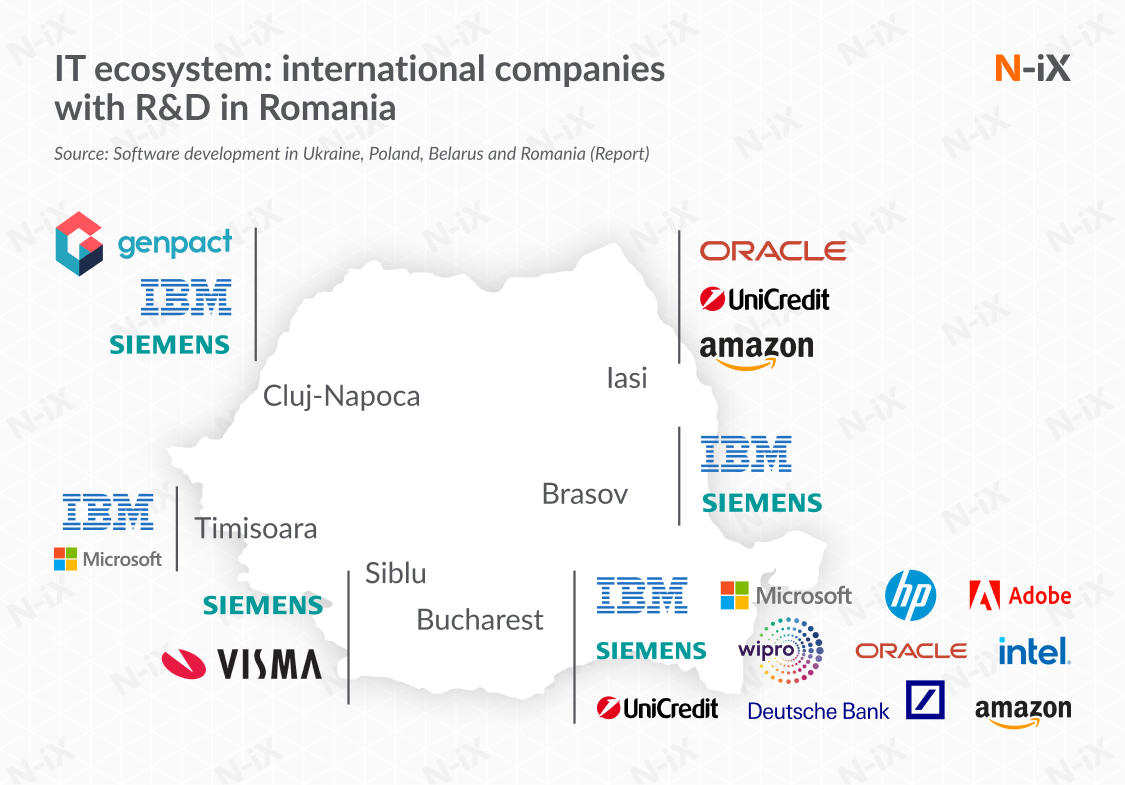When considering offshore software development in Romania, it's crucial to comprehensively analyze the Romanian ICT market, the availability of tech talent, significant tech hubs, and the capabilities of local IT vendors. We have gathered key insights that will allow you to make an informed decision about whether or not offshoring to Romania is the right choice for your business.
Offshore software development in Romania: Market overview
Romania has established itself as a prominent offshore software development hub. With a developer count exceeding 202,000 people as of 2024, the country boasts a substantial pool of experienced tech experts capable of addressing complex technical issues. Key Romanian cities like Bucharest, Cluj-Napoca, and Iasi have emerged as thriving IT centers housing companies that provide top-notch engineering services to businesses in the US and EU.
Learn more about software development in Romania

According to the Association of Business Service Leaders, 94% of companies see Romania as a good location for investments. The clients of local IT firms predominantly come from sectors such as banking, insurance, and industrial and consumer goods. These clients consistently seek premium development services, a demand that Romania effectively meets. One of the key reasons for this is a combination of highly competitive costs and a substantial pool of IT professionals boasting exceptional technological and linguistic skills. Let’s now explore the country's key market factors that drive businesses to offshore software development outsourcing to Romania.
Why Romania for offshoring?
Romania stands out as an offshore location for companies that want reliable delivery, strong technical expertise, and more predictable development costs. It offers access to experienced engineers who can support product work remotely while maintaining high communication standards and awareness of global technology practices. For businesses operating in the US, Canada, or Western Europe, an offshore partnership in Romania extends capabilities without the overhead of local hiring.
The country’s IT sector is built around long-term cooperation with international clients and product companies. As a result, Romanian offshore teams are accustomed to distributed work, shared ownership of technical decisions, and progressive delivery models. Companies can scale up development quickly, cover more engineering hours across time zones, and keep complex projects running without delays.
Offshoring in Romania enables organizations to run parallel workstreams, accelerate release cycles, and secure hard-to-find skill sets. This combination makes Romania a practical offshore base for businesses that need stability, ongoing delivery, and access to diverse technical skill sets.
Industry recognition of Romania as a prominent tech hub
In the 2023 Global Services Location Index, Romania secured the 30th position among the top locations for outsourcing. Notably, the share of ICT services in the overall GDP experienced a substantial growth of nearly 5.88% in 2021 and an impressive 6.4% in 2022.
Blooming economic landscape
Being a part of the European Union brings Romania numerous socio-economic advantages. Notably, EU membership translates to a stable and secure business environment, which is advantageous for offshore software development. Currently, the nation stands among the top five European Union countries experiencing the swiftest economic growth.
Strong governmental support of the ICT sector
The Romanian government plays a pivotal role in nurturing the country's economic advancement and stability. Their commitment extends beyond mere rhetoric, as they actively provide consistent funding and establish supportive regulations for the country's economic framework. Additionally, the government's efforts have led to substantial foreign investments from international organizations, with significant investments directed toward the local IT market. Initiatives such as establishing new IT hubs and supporting innovative projects underline their dedication to fostering growth.
High-quality IT infrastructure and connectivity
Romania stands out for its rapid Internet connectivity and robust telecommunications networks, both of which have proven crucial. The introduction of 5G services has further fortified its technological landscape. Romania secures its place among the countries with the highest Internet speed, outpacing Germany, Austria, Norway, Sweden, and France.
Romania's IT infrastructure is adept at supporting projects of all sizes. With access to the fourth-best fixed broadband speed globally (214.3Mbps), developers can efficiently develop, test, and refine software products, resulting in a notably faster time-to-market for their solutions.

High cybersecurity level
In 2021, Bucharest hosted the European Cybersecurity Competence Center. This hub is used to distribute EU and national funding for cybersecurity research projects.
The primary mission of the EU Cyber Centre is to bolster the European Union's ability to withstand, deter, and effectively respond to cyber-attacks. This mission is driven by the objective of maintaining and advancing critical technological capabilities in cybersecurity and ensuring the protection of the EU's Digital Single Market (DSM).
Since the academic year 2019-2020, Romanian universities have offered more than 15 cybersecurity programs. These programs cover topics including securing military information systems, cryptography, digital investigations, etc.
Such attention to cybersecurity allows local developers to create secure solutions and bring competitive advantages to their clients.
Offshore software development outsourcing to Romania: Key insights about talent
The highly skilled workforce is one of the main drivers that boost the technology sector in Romania. The ICT sector accounts for about 6.2% of the country's GDP. Romania's ICT exports are predicted to reach $9.3B by 2026, reflecting a notable increase from the $7.4B recorded in 2021. In 2023, the country's IT services exports were worth approximately $8B.
Moreover, the country has garnered recognition for its top-tier IT services, securing the 23rd spot in SkillValue's rankings and the 12th position in the TopCoder rankings. In addition, Romania has demonstrated significant advancements in English proficiency, achieving the 17th position in the EF EPI ranking. This progress has yielded a robust pool of highly skilled professionals proficient in English.
Strong ICT education
There are a total of 49 public and 8 private universities in Romania. Notably, Babes-Bolyai University, the University of Bucharest, and Alexandru Ioan Cuza University hold the top three positions among the country's universities, as per the QS World Universities Ranking 2023. These institutions play a pivotal role in producing IT professionals who contribute to the thriving Romanian tech hubs, such as Cluj-Napoca, Bucharest, Iasi, and several others.
Lately, Romania has observed a notable increase in the number of students and graduates within the ICT sector. In 2021, the figures stood at over 40,000 students and around 9,300 graduates. Furthermore, Romania possesses one of the EU's highest proportions of graduates in ICT and STEM fields. This impressive pool of ambitious young tech professionals, combined with an innovation-driven atmosphere, contributes to the thriving state of Romania's start-up landscape.
The ability to establish effective offshore collaboration despite time zone differences
Romania's geographical proximity to various European countries translates to minor time zone differences. It is situated one hour ahead of Eastern European countries and two hours ahead of Western European countries. Businesses operating within the EU reap significant advantages by opting for offshoring to Romania due to the minimal time zone difference.
However, in the context of the United States, the time difference is more pronounced. Romania is ten hours ahead of West Coast cities like Los Angeles and seven hours ahead of East Coast cities like New York. Despite this time discrepancy, Romanian developers are flexible when collaborating with US clients. With a well-structured schedule in place, working with them should not pose significant challenges.
Moreover, Romanian tech vendors have extensive experience working with clients from the US. So they can establish effective communication and ensure a timely and efficient development process.
These and other factors have encouraged many industry leaders to establish a presence in Romania. Here are some companies that have established their presence in Romania and benefited from hiring local talent.

Why businesses opt for offshore software development outsourcing to Romania
- Competitive cost structure. Romania benefits from a significantly lower cost of living compared to Western European nations and the United States. This translates into cost savings for companies that go for offshore software development in Romania. Moreover, other operational expenditures such as office space, utilities, and administrative costs are also notably economical in Romania, contributing to comprehensive cost-efficiency.
- Outstanding skill set. Romanian software engineers possess exceptional qualifications, with high skill levels and strong educational backgrounds. Many of these professionals hold degrees from esteemed regional universities and exhibit proficiency in diverse programming languages and cutting-edge technologies.
- Robust infrastructure. Romania's well-established infrastructure includes reliable telecommunications networks and a favorable business climate.
- Diversity and inclusivity. According to the International Trade Administration, about 24% of ICT graduates in Romania are female, which means that the country’s work environment is both inclusive and diverse.
All these reasons make this country a great candidate for offshoring software development and team extension in Romania.
Get a complete overview of the 2024 software development market in Romania!


Success!

Wrap-up
In summary, Romania's advantages as an offshore outsourcing destination are underpinned by its competitive cost structure, a pool of highly qualified professionals, and a well-developed infrastructure, all of which position the country as an appealing choice for companies seeking optimal software development solutions.
Why should you choose N-iX for offshore software development in Romania?
- N-iX boasts an extensive talent pool of over 2,400 tech experts, and our dedicated recruitment team of around 60 specialists is equipped to help you find and hire the best developers in Romania and Ukraine.
- With nearly two decades of experience in the industry, we have cultivated long-term, strategic partnerships with businesses across the USA, UK, Germany, Nordic countries, and other regions. N-iX has earned the trust and recognition of reputable institutions such as Zinnov, IAOP, GSA, Inc. 5000, Software 500, Clutch.co, and more, establishing us as a trusted vendor.
- Our consistent recognition by CRN among the leading solution providers in North America, including Solution Provider 500 and CRN Fast Growth 150, underscores our commitment to excellence.
- N-iX holds prestigious certifications, such as Advanced AWS partner, Microsoft gold certified partner, Google Cloud Platform Partner, OpenText Services silver partner, and SAP partner, ensuring that we offer top-notch expertise and solutions to our clients.
Have a question?
Speak to an expert




